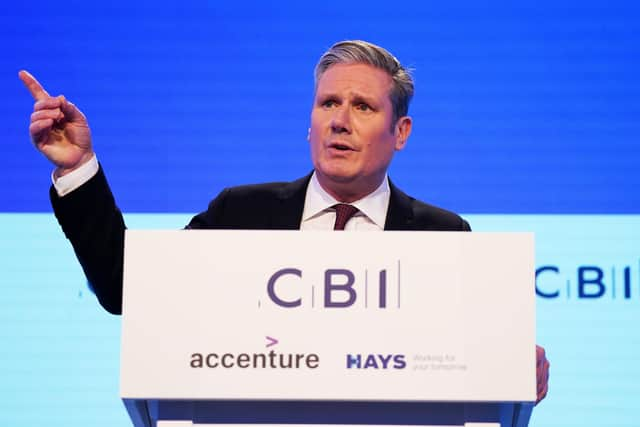Swing voters want open migration, research suggests
Analysis by the Institute for Public Policy Research (IPPR) think tank has found that a more flexible approach to immigration would attract many more swing voters than it would repel for Labour.
Meanwhile for the Conservatives a restrictive policy on immigration now alienates as many swing voters as it attracts.
Advertisement
Hide AdAdvertisement
Hide AdIt comes as Sir Keir Starmer told the Confederation of British Industry conference yesterday that business and government “must be to help the British economy off its immigration dependency.”


This is despite calls from the CBI for a more relaxed policy to allow more overseas workers to fill the high number of vacancies in the UK.
Labour’s suggestion was welcomed by some groups with Alp Mehmet, Chairman of Migration Watch UK, said: “It is welcome that the Labour leader is at last paying attention to widespread public concern about the sheer scale of continuing immigration.
“But he has made no commitment to reduce it. Until he does so he will be no more credible than the Tories on this issue which is vital for our future.”
Advertisement
Hide AdAdvertisement
Hide AdNigel Farage, the former UKIP leader, said Labour was now “to the right of the Conservatives on immigration”.
However, the IPPR argued that its findings came as part of a “sea change” in attitudes to immigration, with both major parties seemingly out of step with the public on the issue.
According to an illustrative model of voting behaviour focusing on the swing voters most likely to switch parties, Labour could attract 5 per cent of the public, according to the research.
In contrast, only 1 per cent of the public would be attracted to Labour if it adopted a restrictive stance on immigration, and 11 per cent would be repelled.
Advertisement
Hide AdAdvertisement
Hide AdThe analysis comes after a decade of warming public attitudes to immigration, which now sees half of the public express positive views of migration, compared to one-third in 2014.
Rob Ford, professor of political science at Manchester university and co-author of the report, said: “There has been a sea change in public opinion on immigration in the past decade, unlocking a centre ground majority for an immigration system which combines clear and well enforced rules with open flexible policies to maximise the gains from immigration, compassion to those fleeing conflict and generosity to those who have made their homes in Britain.
“The public value the social and economic contributions of immigrants and support reforms to better recognise these contributions through more open, flexible criteria for entry and easier pathways to settlement and citizenship for those who have made their homes in Britain.”
The debate over immigration came amid further warnings about the state of the UK economy, with the Organisation for Economic Co-operation and Development (OECD) warning that the UK economy will contract more than any of the world’s seven most advanced nations next year.
Advertisement
Hide AdAdvertisement
Hide AdThe OECD also took aim at the UK Government’s support efforts to cap energy bills at around £2,500 until April, saying it will push up inflation and mean households and businesses will be hit by higher interest rates as a result as policymakers look to rein in price and wage rises.
Meanwhile the official UK economic forecaster warned MPs that “2023 is going to be a very difficult year” for households as bills continue to rise.
Office for Budget Responsibility (OBR) committee member David Miles issued the stark warning days after the body forecast the UK faces a recession lasting more than a year.
Mr Miles said the impact of rising interest rates and continued inflation will cause pressure next year, but they are predicted to turn a corner moving into 2024.
Speaking to the Treasury Committee, the economist said: “2023 is going to be a very difficult year, very likely, but the years after it will not be quite as bad.”